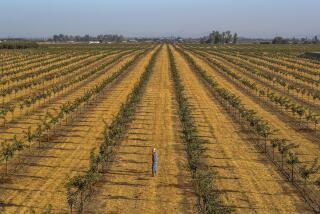Justices Skeptical of Produce-Ad Law
- Share via
WASHINGTON — In skeptical questioning Monday, the justices of the Supreme Court sharply disputed the need for the government to require agricultural producers to pay for generic advertising to promote their products.
The requirements, in the form of federal and state government “marketing orders” that collect as much as a combined $1 billion a year, are deeply rooted in California farming on products ranging from milk to peaches.
“What’s the government’s interest here? That’s what I don’t understand,” Justice Ruth Bader Ginsburg said in the opening moments of Monday’s argument.
Added Justice Antonin Scalia, “This sounds like something time-warped out of the 1930s,” when the government during the New Deal era tried to make itself a partner with industry.
The marketing programs indeed stem from a New Deal-era law, the Agricultural Marketing Act of 1937. But during the 1960s and ‘70s, federal officials expanded their marketing-control efforts through generic advertising programs funded by growers.
These days, their simple messages appear on billboards--”It’s the Cheese”--or in newspaper and TV ads for beef, milk and raisins. Some promotions are nationwide, administered under federal marketing orders, while other programs tout the products of individual states--Florida oranges, for example. California has 47 promotion programs for commodities produced in the state.
But these mandatory payments have come under attack from some producers in California’s fertile Central Valley. They say their peaches, plums and nectarines are distinctive, and they resent paying for promotions that suggest all peaches are the same.
Last year, the U.S. 9th Circuit Court of Appeals in San Francisco ruled in their favor, saying the assessments for advertising violate the 1st Amendment by forcing them to help their competitors.
If the high court were to agree, the decision could unravel many of the promotional efforts.
Defending the programs, Assistant Solicitor Gen. Alan Jenkins said they have “overwhelming support” in the industry. Recent votes among peach producers found that more than 75% supported generic advertising, he said.
Responding to questions, he said that the government’s interest is in maintaining “orderly markets.” But he struggled to explain why forced advertising is a necessary element.
If promotional programs are so important, asked Justice David H. Souter, why is there a federal marketing program for California peaches but not Georgia peaches?
Chief Justice William H. Rehnquist wondered whether the beer industry, seeing the growth of microbreweries, could demand a government-funded program of forced assessments to promote generic American beer.
Jenkins replied that federal officials would have to judge whether such a program was important and needed.
“So you think beer is less important than peaches,” Scalia interjected.
In an unusual twist, Fresno attorney Thomas E. Campagne won the right to present a 30-minute argument for peach growers against the forced assessments.
From the beginning of the case in 1988, Campagne had represented 16 growers and handlers who opposed the government program. But when the case reached the high court, a majority of the growers concluded they should be represented by a 1st Amendment specialist. They chose University of Chicago professor Michael McConnell, an experienced advocate in the high court.
But Campagne, supported by some of the growers, refused to step aside. Last week, the dispute came to a head, and the two sides agreed to settle it with a coin toss in the clerk’s office.
“We flipped and I lost,” McConnell said Monday.
The growers may have lost too. The Fresno lawyer rattled off details about the handling of plums and peaches, and cited a series of stipulations from the lower court record. But the justices, expecting to hear a 1st Amendment argument, soon showed frustration.
“We have an awful lot of details floating around here,” said Justice John Paul Stevens.
“What is the 1st Amendment problem? You haven’t answered that,” an exasperated Justice Sandra Day O’Connor said after 15 minutes.
Campagne said his clients do not want to be “forced to associate with their competitors,” the other peach growers. “All California peaches are not the same.”
Although most of the justices sounded as though they opposed the government program, several seemed less certain after hearing Campagne. A decision in the case of Glickman vs. Wileman Brothers, 95-1184, can be expected in several months.
More to Read
Inside the business of entertainment
The Wide Shot brings you news, analysis and insights on everything from streaming wars to production — and what it all means for the future.
You may occasionally receive promotional content from the Los Angeles Times.











